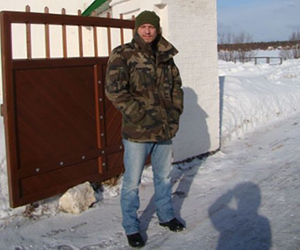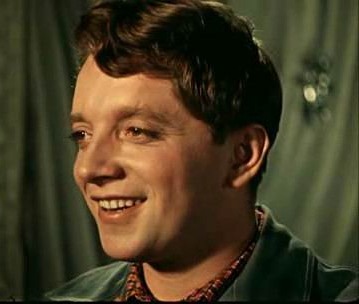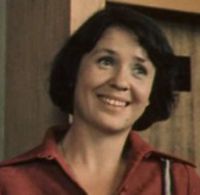Thirty-six year old Svyatoslav Belov, the son of two famous Soviet actors, Yuri Belov and Svetlana Shvaiko, today lives and works in the monastery of St. Anthony of Siya, in the Russian far north. A life broken by drug addiction has brought him to the wilderness of Archangelsk region, here he is healing his spiritual wounds, trying to live, as he puts it, “like a human being”. He returned just two weeks before we this interview to the monastery from Moscow, where he was being filmed for a television show called, “Let them Talk” [a series portraying real-life situations].
A Girl from Cyrpus
 Svyatoslav Belov. Photo: Natalia Popova.
Svyatoslav Belov. Photo: Natalia Popova.
From behind the building that houses the tea room comes a modest and pleasant looking young man in jeans and a light quilt jacket. His curly hair is tied back in a pony tail. He smiles and says hello. He says that he was waiting for guests. His eyes are squinting at the bright sun, and I notice a serious malady in them. All ten “sick” and lonely years can be seen in his eyes. We walk into the house, where we can sit alone and talk. Svyatoslav immediately starts a conversation about everything. He converses quietly and voraciously—maybe because I am suddenly someone to talk to? He tells me how after the television show he started receiving letters, or rather, the monastery abbot, Fr. Varlaam started receiving them. “A girl from Cyprus (originally from the Ukraine) wrote to me,” Svyatoslav tells me smiling. “She wants to get to know me, to come to Archangelsk—or I could come to her in Cyprus.” He says this but doesn’t believe his own words. Will he really go to Cyprus one day? Well, anything is possible in his life. We sit down for a cup of tea, and now he can’t be stopped. His story is not the only one like it—there are very many people just like him. Only he wants out, he’s tired of it all.
“It’s a trap”
“I haven’t been very easy to deal with lately,” he jokes sadly. When mother died this hell broke loose; it was in 1999 and I was twenty-three years old. As soon as mama died I landed in prison, and stayed there for two and a half years. How I wish that it were all different. But perhaps those thirteen years were necessary for some reason? Now I am stronger; I was a spoiled, naïve boy. After high school I didn’t go on to college, and what was there to do? Nothing. I worked for Rolan Antonovich Bykov [Soviet actor, producer, and screenplay writer], and wanted to enter the Institute of Culture. But it didn’t work out, because I was arrested for the first time for drug possession and there was a trial; the papers were sent to the studio. Rolan Antonovich helped me out then, he wrote a good character reference, and they gave me a year’s commuted sentence. We weren’t together very long but I was very close to him. Bykov knew my situation, he knew I was a drug addict. He said, ‘I’ll have you cured. I’ll send you to a doctor I know.’ I was very involved in my work with him.
“He produced the program, ‘Domovoi’, a documentary film about an unknown soldier. He was involved in a charitable organization for the development of cinema and television for children and young people, and I worked with him on a children’s film festival. I was an assistant cameraman at ‘Mosfilm’ studios. I wanted to work for the rest of my life in cinema. I also worked as a cook in restaurants—I learned that from my mother.
“After his death I was fired, and then mama began to have troubles—she came down with cancer. With all this going on there could be no question about studying. Then mama died and I landed in jail. I have a second mother, Alla Budnitskaya. When she is around I feel like I am home again, as if mama is next to me. Mama loved me very much… I lost my father when I was fifteen.”
 Syatoslav's father, actor Yuri Belov. He was a very popular actor in the 1950's but after making a remark about Khrushev at a dinner, was taken to a psychiatric hospital. He was released a year later, but his career was basically over. Belov played bit parts until he died in 1991. All who knew him remembered his extraordinarily good nature, and call his later years tragic.
Syatoslav's father, actor Yuri Belov. He was a very popular actor in the 1950's but after making a remark about Khrushev at a dinner, was taken to a psychiatric hospital. He was released a year later, but his career was basically over. Belov played bit parts until he died in 1991. All who knew him remembered his extraordinarily good nature, and call his later years tragic.
“It’s hard to break with the past”
Svyatoslav’s friend Michael sent him to the monastery of St. Anthony of Siya. They used to take drugs together, only Michael’s parents pulled him out of it. In 2008, Misha found Svyatoslav in a prison zone in Lipetsk, called him and said that everything will be okay, sent him a package, and when he was released gave him the address of the monastery. He had been there himself; his mother knows Fr. Barsanuphius and Fr. Varlaam well, also the former abbot, Archimandrite Triphon. “Almost three years ago I boarded a train and came here,” Svyatoslav sighs deeply. “By then I wanted it myself, I wanted to go somewhere, to come to myself. Of course I didn’t know, didn’t imagine how hard it would be. It’s hard, I won’t hide it. Even now, after three years. It is hard to break with your inner world, your old habits. It is a true inner struggle.”
 Svyatoslav's mother, Svetlana Shvaiko.
Svyatoslav's mother, Svetlana Shvaiko.
“Now things have sort of come into place,” he says. “I am trying to leave more gradually; I ask Fr. Barsanuphius’s blessing to go to town for a change of scenery. I used to get overtaken by a strong urge, and a couple of times I just ran out and hitchhiked to Moscow. When I returned I got into an argument with batiushka, but he forgave me and let me come back. I didn’t last long in Moscow. It’s too early for me to go there yet.”
Svyatoslav does not count out the possibility that he may never go back to Moscow, that he might stay here in the north. He talked about how he met a girl from Archangelsk. She saw him recently on television and was shocked. She didn’t know before seeing the program that Svyatoslav’s parents were movie stars. “I am glad we met,” he said as he sipped his warm tea. “Not much good happens to me.”
“Perhaps I am tired of being here, closed off from the world. Everything is different here, it’s tougher here than in prison—it’s totally open, there are no fences, you are your own captive and you can do as you please. You can get up and go because no one is forcing you to stay—that is what makes it so hard. You hold yourself back because you know that it’s too early for you to leave. In prison there is a fence, barbed wire, you can’t leave, and so you reassure yourself, but here… It gets you down periodically. Especially during Great Lent when temptations get stronger. I think that there really is something to that; as soon as the fast begins you feel like you can’t go on, but you do. The Lord endured and so must we.
“If I’ll have a loved one, I’ll want to go on living for sake of that person. I want children; human desires get acute at times. I am wearied by loneliness. Thank God for Fr. Varlaam and Fr. Barsanuphius, they have helped me very much, although it is not easy for them to maintain this large monastery. The monastery helps those who have nowhere else to go, it helps them settle into old age homes and shelters.”
—Svyatoslav, can an addict be cured of his drug addiction in a monastery? Without medicines?
—It’s possible. You can physically get through the withdrawal pains. Coping with the psychological pressure—that is the hardest thing.
